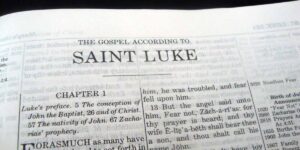Matthew, or Levi, son of Alpheus, lived in Capernaum. He was a publican or tax collector. He wrote the Gospel that bears his name. He died a martyr in Ethiopia.
The call of Matthew to the apostolic band is mentioned in Mark 2:14, Matthew 9:9 and Luke 5:27-28. From these passages, we learn that Matthew also was called Levi. It was a common custom in the Middle East at the time of Christ for men to have two names. Matthew’s names mean “a gift of God.” The name Levi could have been given to him by Jesus. It is likely that James the lesser, who was one of the twelve Apostles, was Matthew’s brother, also the son of Alpheus. Although we know little about Matthew personally, the outstanding fact about him is that he was a tax collector. The King James Version calls him a publican, which in Latin is Publicanus, meaning engaged in public service, a man who handled public money, or a tax-gatherer.
Of all the nations in the world, the Jews were the most vigorous haters of tax-gatherers. To the devout Jew, God was the only one to whom it was right to pay tribute in taxes. To pay it to anyone else was to infringe on the rights of God. The tax collectors were hated not on religious grounds only but because most of them were notoriously unjust.
In the minds of many honest, Jewish men, these tax collectors were regarded as criminals. In New Testament times they were classified with harlots, Gentiles, and sinners (Matthew 18:17; Matthew 21:31, 33; Matthew 9;10; Mark 2:15,16; Luke 5:30). Tax collectors had been known to assess duty payable at impossible sums and then offer to lend the money to travelers at a high rate of interest. Such was Matthew. Yet, Jesus chose a man all men hated and made him one of his men. It took Jesus Christ to see the potential in the tax collector of Capernaum.
Matthew was unlike the other Apostles, who were mostly fishermen. He could use a pen, and by his pen, he became the first man to present to the world, in the Hebrew language, an account of the teaching of Jesus. It is clearly impossible to estimate the debt that Christianity owes to this despised tax-gatherer. The average man would have thought it impossible to reform Matthew, but to God all things are possible. Matthew became the first man to write down the teachings of Jesus. He was a missionary of the Gospel, who laid down his life for the faith of his Master. The apostolic symbol of Matthew is three money bags which reminds us that he was a tax collector before Jesus called him.
More than any other disciple, Matthew had a clear idea of how much it would cost to follow Jesus, yet he did not hesitate a moment. When he left his tax-collecting booth, he guaranteed himself unemployment. For several of the other disciples, there was always fishing to return to, but for Matthew, there was no turning back.
Two changes happened to Matthew when he decided to follow Jesus. First, Jesus gave him a new life. He not only belonged to a new group; he belonged to the Son of God. He was not just accepting a different way of life; he was now an accepted person. For a despised tax collector, that change must have been wonderful! Second, Jesus gave Matthew a new purpose for his skills. When he followed Jesus, the only tool from his past job that he carried with him was his open. From the beginning, God had made him a record-keeper. Jesus’ call eventually allowed him to put his skills to their finest work. Matthew was a keen observer, and he undoubtedly recorded what he saw going on around him. The Gospel that bears his name came as a result.
Matthew’s experience points out that each of us, from the beginning, is one of God’s work in progress. Much of what God has for us he gives us long before we are able to consciously respond to him. He trusts us with skills and abilities ahead of schedule. He has made us each capable of being his servant. When we trust him with what he has given us, we begin a life of real adventure. Matthew couldn’t have known that God would use the very skills he had sharpened as a tax collector to record the greatest story ever lived. And God has no less meaningful purpose for each one of us. Have you recognized Jesus saying to you, “Follow me“? What has been your response?
Strengths and accomplishments
- Was one of Jesus’ 12 disciples
- Responded immediately to Jesus’ call
- Compiled the Gospel of Matthew
- Clarified for his Jewish audience Jesus’ fulfillment of Old Testament prophecies
Lessons from his life
- Jesus consistently accepted people from every level of society
- Matthew was given a new life, and his God-given skills of record-keeping and attention to detail were given a new purpose
- Having been accepted by Jesus, Matthew immediately tried to bring others into contact with Jesus
Vital Statistics for Matthew
- Where: Capernaum
- Occupations: Tax collector, a disciple of Jesus
- Relative: Father: Alpheus
- Contemporaries: Jesus, Pilate, Herod, other disciples
Key Verse for Matthew
“As he walked along, he saw Levi son of Alpheus sitting at the tax collector’s booth. ‘Follow me,’ Jesus told him, and Levi got up and followed him” (Mark 2:14)
Matthew’s story is told in the Gospels. He is also mentioned in Acts 1:13.
Recommended Bible Study Resources
ESV Study Bible – Study Bibles give you a deeper understanding of God’s Word with tools for life application like commentary, maps, charts, concordance, and study notes. Search our popular translations- NIV, ESV, NKJV, KJV and more!
Believer’s Bible Commentary: Second Edition – A Bible commentary is a written, systematic series of explanations and interpretations of Scripture. Commentaries often analyze or expound on individual books of the Bible, chapter by chapter and verse by verse. Some commentary works provide analysis of the whole of Scripture.
The New Strong’s Expanded Exhaustive Concordance of the Bible – The best concordance for word study! This exclusive new edition of a legendary classic puts generations of biblical research at your fingertips. A valuable tool for pastors, teachers, and students of the Bible.
Vine’s Complete Expository Dictionary of Old and New Testament Words – This classic word study resource allows you to study the meaning of biblical words in the original languages without spending years learning Greek or Hebrew. A great resource for students, seasoned pastors, and anyone who enjoys biblical word studies–even if they have little to no formal training in Hebrew or Greek.
Halley’s Bible Handbook – The beloved and classic Bible companion has been thoroughly updated, while retaining its time-honored features and Dr. Halley’s highly personal style, to offer even greater clarity, insight, and usefulness.
Click here to print or download the Bible character study “Matthew – Jesus is the Messiah“








